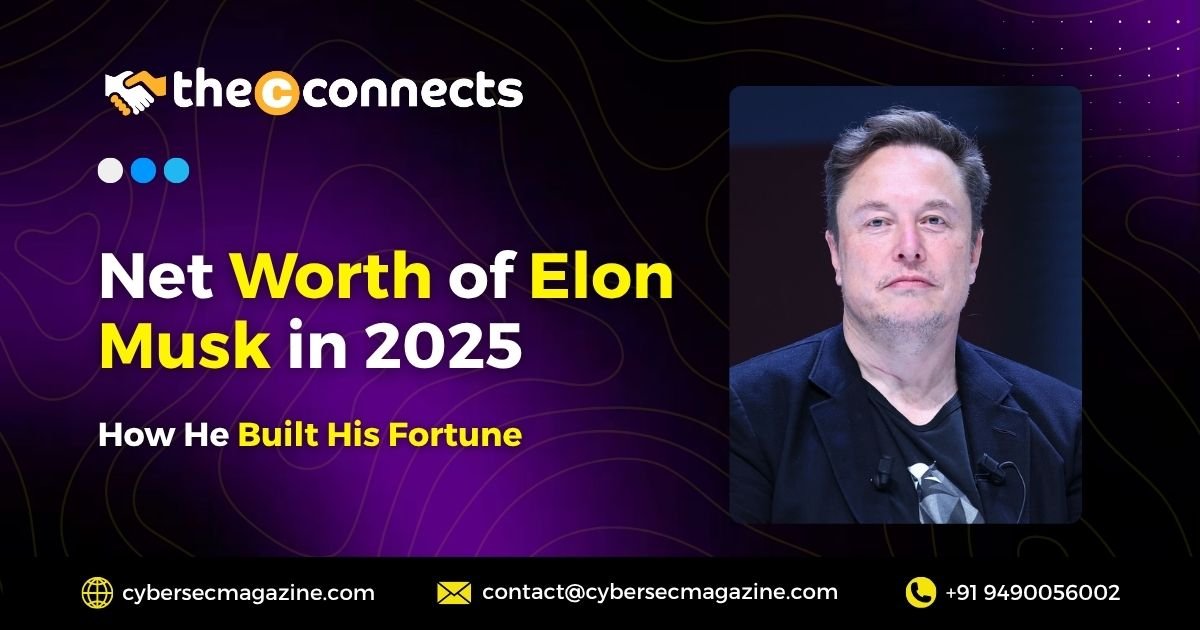For TheCconnects Magazine -tailored for entrepreneurs, business leaders and C‑Suite professionals
In the modern corporate‑ecosystem, few individuals exemplify the intersection of innovation, risk‑taking and wealth creation better than Elon Musk. As founder, CEO or major stakeholder in companies such as Tesla, Inc., SpaceX, X Corp. (formerly Twitter), xAI and more, Musk has not only helped shape sectors -electric vehicles, space launch, social media, artificial intelligence -but has built a fortune that sets new benchmarks for the 21st‑century entrepreneur. In this article we examine his estimated net worth in 2025, trace the sources of his wealth, highlight strategic lessons for business leaders, and unpack how Musk’s journey offers a blueprint for building enterprise value in fast‑moving markets.

1. The Current Estimate of Elon Musk’s Net Worth
According to multiple reliable sources, as of October 2025 Elon Musk’s net worth is estimated to have crossed US$500 billion. Forbes reported that Musk briefly became the first person ever to hit a net worth of US$500 billion.
Other indices provide conservative estimates: Bloomberg estimates around US$470–US$475 billion.
Thus, for high‑level business analysis, Musk’s net worth in 2025 can reasonably be placed in the US$450‑500 billion range, making him arguably the richest person on the planet. This figure is not merely a personal wealth statistic-it is an indicator of a vast enterprise ecosystem anchored in equity stakes, innovation portfolios and visionary positioning.
2. The Building Blocks of His Fortune
Musk’s wealth is not derived from a single company or payout. Rather, it is a layered accumulation of equity, innovation‑driven value, reinvestment and platform creation. Below are the central pillars:
a) Tesla, Inc. (EVs + Energy)
Musk’s largest single‑asset value lies in his stake in Tesla. In October 2025, Tesla’s share price strength helped fuel strong gains in his net worth.
Tesla, founded in 2003 and headed by Musk since 2008, has grown from niche EV maker to a global automotive & energy‑systems powerhouse. The company’s valuation, large manufacturing footprint, and energy ambitions provide the foundation for Musk’s wealth.
b) SpaceX
Musk’s aerospace venture SpaceX has become a critical asset in his portfolio. At various valuations, SpaceX has been cited at hundreds of billions of dollars. For example, estimates ranged at around US$400 billion for the company in mid‑2025.
Musk’s share‑ownership in SpaceX and its strategic contracts (e.g., NASA, Starlink satellite internet) turn what was once speculative into major enterprise value.
c) xAI, X Corp. and Other Ventures
Musk’s diversification is substantial. His artificial‑intelligence startup xAI, plus the social‑media platform X (formerly Twitter), and other technology ventures add to the enterprise ecosystem. For instance, xAI in 2025 was valued at tens of billions in private funding.
Though smaller in scale compared to Tesla or SpaceX, these businesses show Musk’s strategic intent: to own not just one market but multiple frontier‑markets (EVs, space, AI, social media, energy).
d) Equity‑Driven Compensation and Growth
Importantly, Musk’s compensation structure has been heavily equity‑driven (especially at Tesla). He holds large stock‑options, stake‑packages and long‑term incentives tied to performance milestones. This means his wealth grows primarily as his companies succeed rather than via conventional salary.
In other words, Musk is less an employee and more a founder‑owner whose wealth scales with enterprise value.
e) Reinvestment & Long‑Term Vision
Unlike some billionaires who diversify into passive holdings, Musk continues to reinvest heavily into his core enterprises: new factories, next‑gen rockets, AI systems, energy infrastructure. This approach enhances future value rather than merely monetising existing wealth.
3. Key Strategic Moments that Accelerated His Wealth
From a business‑leadership lens, Musk’s fortune rose through several key strategic inflection points:
- Early Investment in Tesla & Vision for EVs: Musk’s early backing and leadership at Tesla positioned him ahead of the EV wave.
- Scaling SpaceX Commercial Launch & Starlink Internet: By making reusable rockets and satellite network viable, Musk created a new category worth billions.
- Aggressive Global Manufacturing & Vertical Integration: Tesla’s gigafactories, energy products, battery development reduce dependency and enhance margin potential.
- Timing & Market Momentum: Tesla stock surges, investor enthusiasm for AI/space, and trend cycles have worked in Musk’s favour. For example, the October 2025 Tesla share price increase fueled his net‑worth milestone. (Reuters)
- Pushing into Frontier Technologies: His forays into AI, brain‑computer interface (via Neuralink), tunnelling (The Boring Company) demonstrate he’s not just riding waves but creating them.
4. What Business Leaders Can Learn from Musk’s Wealth Creation
For entrepreneurs, corporate strategists and C‑Suite executives, Musk’s journey offers rich lessons:
Build Ownership, Not Just Salary – Musk’s wealth derives from equity stakes and creating assets. Business leaders must think like owners, not just executives.
Own Emerging Platforms – Instead of only participating in existing markets, Musk invests in the creation of new markets (e.g., reusable rockets, mass‑scale solar energy). Being at the frontier yields outsized returns.
Integrate Vision + Execution – Musk’s strategy is simultaneously visionary (multi‑planetary life, sustainable energy) and execution‑focused (factories, rockets, satellites). Successful leaders must balance big dreams with disciplined delivery.
Reinvest for Future Value – Rather than cashing out early, Musk invests profits back into growth. Business growth is compounding; conscious reinvestment matters.
Manage Risk but Embrace Big Bets – Musk’s companies are high risk (capital intensity, technology risk), yet big reward. Business leaders should calibrate risk appetite and avoid being overly conservative if they want exponential growth.
Diversify Across Value Ecosystems – Rather than relying solely on one business, Musk spreads across inter‑locking ecosystems (automotive + energy + space + AI). For companies today, building portfolio synergies matters.
Leverage Brand & Public Narrative – Musk’s personal brand-his visibility, persona, narrative of ambition-increases his enterprises’ value. Leaders must recognise how personal and corporate brand interplay affects perception and value.
5. Challenges, Risks & Future Outlook
Despite the staggering fortune, Musk’s path is not without risk -and business leaders should note the following:
- Market Volatility: Musk’s wealth swings significantly with stock price movement at Tesla and valuations at SpaceX. A sharp drop in Tesla shares previously caused large wealth losses.
- Execution Risk: Megaprojects (Mars rockets, self‑driving cars, AI breakthroughs) carry high technological and regulatory risk. Failure in execution could impact enterprise value.
- Public & Brand Risk: Musk’s public statements, social‑media actions and political involvement have at times triggered reputational challenges and investor concern.
- Concentration Risk: While Musk has diversified, a large portion of his value remains tied to a few core companies. Over‑exposure to one company’s fortunes can create vulnerability.
- Regulatory & Macro Risk: Industries such as automotive, energy, aerospace are heavily regulated and capital‑intensive; market cycles, geopolitical shifts, subsidy changes all impact value.
Despite these risks, the outlook remains strong. With Tesla scaling globally, SpaceX maintaining aerospace dominance, AI & social‑media ventures advancing, Musk’s enterprise platform is poised for further expansion -pointing to potential wealth growth beyond 2025.
6. Final Thoughts
In 2025, Elon Musk is not simply the richest person in the world -his wealth is a reflection of a bold entrepreneurial ecosystem, a portfolio of visionary companies, and a mindset that blends ambition with execution. With an estimated net worth of up to US$500 billion, he stands as a living exemplar of how modern wealth is created: by owning platforms, stepping into frontier markets and reinvesting for scale.
For readers of TheCconnects Magazine -CEOs, founders, board members, strategists -Musk’s story is more than curiosity. It is a roadmap: build assets, invest in change, maintain leadership across multiple domains, and always think about the future, not just the next quarter.
Want to get featured or publish your own guest article in TheCconnects?
📩 Email: contact@thecconnects.com
📞 Call: +91 91331 10730
💬 WhatsApp: https://wa.me/919133110730



